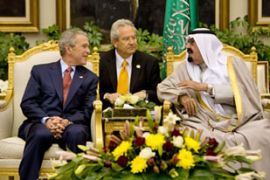Bush moves to seal Saudi arms deal
US administration tells congress of plan to sell $20bn of weapons to Arab ally.

Published On 15 Jan 2008
Rob Reynolds, reporting for Al Jazeera from Riyadh, said the deal was likely to provoke controversy in congress.
“There are political questions in the US, always, involving any arms sales to Arab countries because of the very strong support in the US congress for Israel,” he said.
“The US congress needs to approve this arms deal – that’s US law.”
The sale appeared to be part of Bush’s effort to persuade Saudi Arabia to help contain Iran and offset what he has branded a danger to the oil-rich region and to the world’s security.
Bid to isolate Iran
Ratcheting up the rhetoric, Bush declared in a speech in Abu Dhabi earlier this week that Iran was “the world’s leading state sponsor of terror”.
Tehran denounced Bush’s comments as “words without value”.
During his visit to Saudi Arabia, his first visit to the oil-rich US ally, Bush hopes to rally support for his campaign to isolate Iran.
His administration, which has also announced a $30bn military aid pact with Israel, has argued the deal with the Saudis is needed to counter what it claims is a “major security threat” from Iran.
While Sunni-ruled Saudi Arabia has voiced concern over the rise of Shia Iran, it is opposed to another war after the 2003 US-led invasion of Iraq that has strengthened the government in Tehran.
Diplomatic tour
|
Your Views |
|
“I fear that President Bush’s visit will be no more than a Public Relations Stunt to bolster the shaky Ehud Olmert’s government” |
A senior US official said Bush would also use his trip to court Riyadh’s diplomatic influence and financial muscle which “could make an enormous difference in places like the Palestinian territories, Lebanon, Iraq, Afghanistan and other locations”.
In the last few days of his Middle East tour, Bush has been courting Gulf Arab allies to help shore up a US-backed peace effort between Israel and the Palestinians and combat Iran’s growing influence in the region.
Saudi Arabia is considered a linchpin for any broader Israeli-Arab reconciliation as Bush presses Israelis and the Palestinians to secure a peace deal before he leaves office in January 2009.
Iran was also expected to be an important part of Bush’s talks with King Abdullah, the Saudi monarch, and was also discussed in Bush’s earlier meetings with Gulf Arab leaders in the UAE.
While the Gulf leaders share US concerns about curbing their powerful Shia neighbour, they want to avoid another war in the region.
“All agreed it’s a difficult problem that needs to be addressed, and at this point pursue in a diplomatic fashion,” Hadley told reporters when asked how UAE leaders had reacted to Bush’s entreaties on Iran.
Engaging Iran
Analysts say there are growing signs that America’s Arab allies prefer to engage Iran.
Last year, Saudi Arabia invited Mahmoud Ahmadinejad, the Iranian president, to undertake the Hajj, making him the first Iranian president to receive an official invitation to the annual Muslim pilgrimage.
Also in the region on Monday, was Nicolas Sarkozy, the French president, who visited Qatar and was later to travel to the UAE.
At the start of his regional tour, Sarkozy also met kind Abdullah in Saudi Arabia, where he offered Saudi Arabia help in developing peaceful nuclear energy.
The French president expects to sign a nuclear co-operation agreement with the UAE on Tuesday.
Source: Al Jazeera, News Agencies
